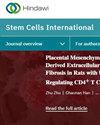Human Umbilical Cord Perivascular Cells Prevent Tumor Growth in a Melanoma Tumor-Bearing Mouse Model and Modulate Breast Cancer and Melanoma Cells in a Cell Line-Dependent Manner In Vitro
IF 3.8
3区 医学
Q2 CELL & TISSUE ENGINEERING
引用次数: 0
Abstract
First trimester (FTM) and term human umbilical cord perivascular cells are promising mesenchymal stromal cell candidates to mitigate side effects of oncotherapy, but their safety for cancer patients remains to be determined. This study was designed to determine if human umbilical cord perivascular cells modulate tumor growth when injected systemically in a tumor-bearing mouse model. Immunodeficient mice-bearing palpable subcutaneous SK-MEL-28 human melanoma tumors were randomized to receive a tail vein injection of three human umbilical cord perivascular cell lines resuspended in hank’s buffer saline solution (vehicle) or vehicle only, as a control. Fibroblast cells were included as a cell control in some experiments. Tumor size was monitored weekly and weighed at 3-weeks postinjection. Cell fate and tumor cell proliferation, apoptosis, vascularization as well as tumor-associated immune cells were assessed using immunostaining and flow cytometry. Serum tumor necrosis factor alpha and C-reactive protein levels were measured using enzyme-linked immunosorbent assays. Transwell coculture models were used to study the paracrine effects of multiple lines of human umbilical cord cells on human melanoma cell lines as well as breast cancer cell lines. Systemic administration of FTM and term human umbilical cord perivascular cells, but not fibroblast cells, prevented melanoma tumor growth in a tumor-bearing animal model by modulating tumor cell proliferation and systemic inflammatory mechanisms. Cancer cell- and donor-dependent paracrine effects on cancer cell growth were observed in vitro. Our preclinical studies thus suggest that, with regards to its effects on tumor growth, systemic administration of FTM and term human umbilical cord perivascular cells may be a safe cell therapy to address the side effects of cancer.人脐带血管周围细胞在黑色素瘤荷瘤小鼠模型中阻止肿瘤生长,并在体外以细胞系依赖的方式调节乳腺癌和黑色素瘤细胞
妊娠早期(FTM)和足月人脐带血管周围细胞是有希望减轻肿瘤治疗副作用的间充质间质细胞候选物,但其对癌症患者的安全性仍有待确定。本研究旨在确定在荷瘤小鼠模型中全身注射人脐带血管周围细胞是否能调节肿瘤生长。携带可触皮下SK-MEL-28人黑色素瘤的免疫缺陷小鼠随机接受尾静脉注射,三种人脐带血管周围细胞系重悬在汉克缓冲盐水溶液(对照)中或仅用对照,作为对照。在一些实验中,成纤维细胞被作为细胞对照。每周监测肿瘤大小,注射后3周称重。使用免疫染色和流式细胞术评估细胞命运和肿瘤细胞增殖、凋亡、血管化以及肿瘤相关免疫细胞。采用酶联免疫吸附法测定血清肿瘤坏死因子α和c反应蛋白水平。采用Transwell共培养模型,研究多系人脐带细胞对人黑色素瘤细胞系和乳腺癌细胞系的旁分泌作用。在荷瘤动物模型中,全身给药FTM和足月人脐带血管周围细胞,而不是成纤维细胞,通过调节肿瘤细胞增殖和全身炎症机制,阻止了黑色素瘤肿瘤的生长。体外观察癌细胞依赖性和供体依赖性旁分泌对癌细胞生长的影响。因此,我们的临床前研究表明,就其对肿瘤生长的影响而言,全身给药FTM和长期的人脐带血管周围细胞可能是一种安全的细胞疗法,可以解决癌症的副作用。
本文章由计算机程序翻译,如有差异,请以英文原文为准。
求助全文
约1分钟内获得全文
求助全文
来源期刊

Stem Cells International
CELL & TISSUE ENGINEERING-
CiteScore
8.10
自引率
2.30%
发文量
188
审稿时长
18 weeks
期刊介绍:
Stem Cells International is a peer-reviewed, Open Access journal that publishes original research articles, review articles, and clinical studies in all areas of stem cell biology and applications. The journal will consider basic, translational, and clinical research, including animal models and clinical trials.
Topics covered include, but are not limited to: embryonic stem cells; induced pluripotent stem cells; tissue-specific stem cells; stem cell differentiation; genetics and epigenetics; cancer stem cells; stem cell technologies; ethical, legal, and social issues.
 求助内容:
求助内容: 应助结果提醒方式:
应助结果提醒方式:


